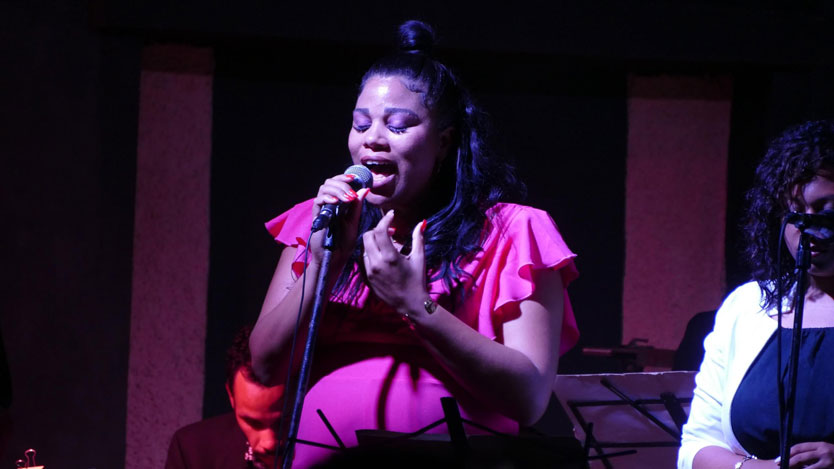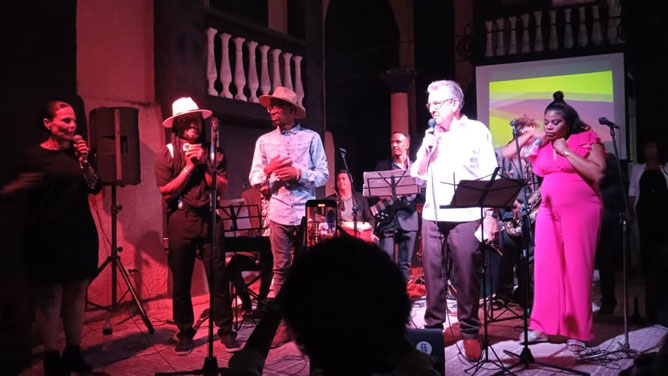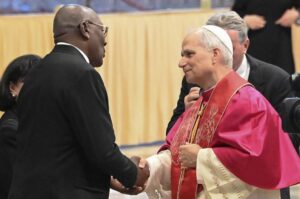The life of the Saturday night was different, as Cuban Gospel Music, a Havana-based group, contributed with their singing to the Piña Colada event in the courtyard of the headquarters of the Avila branch of the Union of Writers and Artists of Cuba (Uneac). However, the group had already «done their thing» in other squares of the city and the public followed them.
The name of this musical group contains an interesting history that inescapably takes us back to the past, but it begins with the interpretation of the original word that precedes it. Godspell is a word – according to dictionaries – from the Anglo-Saxon language, meaning «word of God or energy of God».
Precisely from there it derived gospel, used to refer to the gospels of the Bible, as a means of approaching the divine. In other words, it is a gospel song to invite people to God, and thus the lyrics reflect the values of Christian life.
Gospel music is born out of the tradition of «Negro spirituals» in voices and songs, where musicality springs from the pain, perception and suffering of generations of African slaves who were torn from their land, acculturated, and deported to the United States by the English and white Americans after independence.
Negro spirituals’ – a type of Christian singing that emerged in the late 18th century and developed in the early 19th century in the United States – merged with Christian music to become gospel in the late 19th and early 20th century in the United States. It is spiritual, or gospel, music and, in its narrowest definition, is the American religious music that emerged from the hundreds of African-American evangelical Protestant churches in the 19th century, popularised during the 1930s. This musical phenomenon, over time, spread throughout the world.

Cuban Gospel Music is a Havana-based group which, barely a year after its debut, recreates a divinely inspired musical genre, Cuban-style, in the Piña Colada, and captivated diverse audiences during its performances beyond secular spaces. That is to say, this musical format was expressed, together with other choral entities, in the Jornada Coral Ávila, in the show at Martí Park and other venues.
The courtyard of the provincial headquarters of Uneac, with a significant influx of young people, showcased the talent of the performers and musicians of Cuban Gospel Music. Among the songs performed, several of them are unpublished and, in the case of other choirs, are congregational.
Rita Elena Deliz is the lead singer and composer of Cuban Gospel Music; Jhoan Baez, her husband, is the producer. During the show, the artists performed songs such as Es tiempo and Celebrando, both conceived during the period when the COVID-19 pandemic was raging. Altísimo, by singer-songwriter Mayliet Matos, was also moving.
The day after their presentation at the Uneac headquarters, the artists sang for their brothers and sisters in faith at the headquarters of the Pentecostal Church in the city of Avila, for which the Christian brotherhood was grateful.
The Casa de la Trova Miguel Ángel Luna – inhabited by composers and performers – welcomed the Havana gospel architects in Cuba; the provincial directorate of Culture and Musicávila (Centro de Promoción de la Música y los Espectáculos) gave special recognition to the brand new musical entity.
The group has albums such as Cuban Gospel Music (Volume I), pre-nominated for the Latin Grammy and nominated at the Cubadisco, a compilation of various authors, except for the song Sublime gracia, which is a North American chorus performed by many international artists. There, Sublime gracia is performed by Cristian Alejandro and Rita Elena, co-produced by Edesio Alejandro and Jhoan Báez, father of one and husband of the other, respectively. Gracias, another successful album, is a singular act of musical creation where experimentation and success intertwine.
Something very important about the musical creation of Cuban Gospel Music is that its members are not only interested in creating and promoting gospel as a genre, said Rita Elens, «but as a movement». Intentionally, songs and tunes that are not composed by the group’s members are filtered through the spiritual richness of gospel.
With their presence at the Piña Colada, invited by Musicávila, we witness a new step in the introduction of this music beyond secular spaces, in dialogue with other musical genres.




